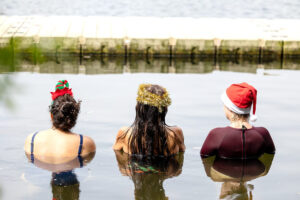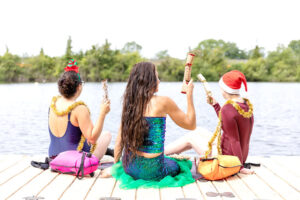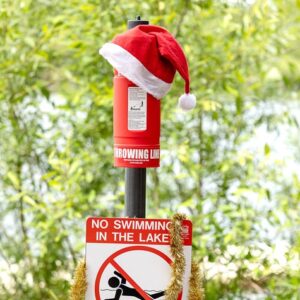
Award-winning writer and comedian Alison Spittle is aiming to get people in the Christmas spirit with her second play Glacier.
It is enjoying its world premiere at the Old Fire Station on St George Street in Oxford, the charity-run culture hub that showcases contemporary UK art, drama and music.
The Christmas-themed play is described as an ode to friendship and wild swimming.
Harrow-born Alison, 34, describes the comedy as ‘an ode to the joyous, unkind and generally dull parts of adult friendships, especially around the festive season’.
It follows three women on Christmas Day, all searching for peace at Lake Foxleighmere.
They are all there for different reasons.
‘Lucy’ thinks it’s the perfect place for a good scream. ‘Jools’ thinks it’s the perfect place to escape her family, just for an hour. ‘Dawn’ thinks it’s the perfect place to be invisible.
When all three create their own tradition of swimming at the same place every year, each character’s troubles bubble to the surface and friendships develop, with warmth, wit and the heartbreak of the festive season.
Directed by Madelaine Moore, ‘Lucy’ is played by Emma Lau (Hollyoaks), ‘Jools’ is played by Sophie Steer, Debra Baker portrays ‘Dawn’.
Writer-actor-comedian Alison is co-creator and co-presenter of the BBC Sounds podcast Wheel of Misfortune, which she presented with Scots comedian Fern Brady, 37, and then Atomic Kitten’s Kerry Katona, 43.
Alison is also a regular co-host of The Guilty Feminist.
She created and starred in TV series Nowhere Fast, which aired on RTÉ2, BBC America and Stan Australia to critical acclaim.
Her first play, Starlet received critical acclaim including from The Sunday Times.
She was born in Harrow to an English dad, a builder, and an Irish mum, The family moved frequently before settling in her mother’s home of Ballymore, Co. Westmeath when she was eight.
Alison told The Irish World: “I’d love for people to come along because I think it’s very funny.
“It’s a bit dark, touches on real world things.
“It’s definitely a play that I’ve written from the perspective of a person that’s grown up sitting at a table while older adults talk about who’s riding who, all that type of gossip and stuff and I think I’ve distilled this into a play of friendship between adult women and the way that they talk to each other.
“I’m in my 30s now and moving over to London, I had to make a whole new friendship group, which made me assess, ‘What type of friend am I? Who do I want to be friends with?’
“People don’t really have that choice.

“Sometimes you don’t choose who your friends are, you just keep friends they have.
“I suppose that’s what the play is about – friendship.
“The first play I wrote was called Starlet and was about was being in a Toyota Starlet with a fella.
“I really liked writing plays and a friend told me that the Old Fire Station in Oxford were looking for Christmas plays so I thought, ‘What can I come up with?’
“I knew that they needed one location and then the idea came to me, ‘Why not do it at a lake?’, because I’m from Westmeath. There’s lots of lakes in Westmeath and a lot of people love to freshwater swim.
“The other thing was I heard a bit of gossip about an affair being found out at Christmas due to a fella saying he was at the lake when he wasn’t.
“I didn’t want to just do a piece of gossip as a play – but I thought about dramatic things that could happen at a lake and why people would be at a lake.
“The play is about three different women.
“They all have different reasons for being at the lake. The last play I did was so Irish.
“It was in the Midlands around the time of the economic downturn when people had to emigrate.
“I wanted to challenge myself to make it not Irish.

“My dad’s English and I wanted to do a play about English people, so that’s what Glacier is about – three English women swimming.
“I was born in London, and I grew up in Westmeath.
“I was always a ‘blow-in’. I became very aware that I was a bit of an outsider, always observing Irish people’s behaviour and then I reflected that back.
“Being born in London, I wanted to be more Irish than (other) Irish people were themselves, and I definitely leaned into being from the country and being a ‘bogger’ (‘culchie’).
“Then I moved here and because my dad is English and my mam is Irish, I’ve always been used to straddling the two different worlds – and I’m always unaware of what is ‘too Irish’ and what is ‘too English’.
“I remember once when I was about mid-teens being on the phone to a lad and I tried so hard to get rid of my English accent – a big part of my childhood was getting rid of that – and we were getting on really well and then he heard something I said that sounded English and he said, ‘You English?’
“’Ah, yeah’.
“He hung up straightaway and I was like, ‘Ah sh*te’.
“The big culture shock between Ireland and England for me was the opening of pubs on Christmas Day – even people having their Christmas dinner in pubs on Christmas Day in Britain just was a strange thing to me.
“I’ve spent half my Christmases in the UK and half my Christmases in Ireland because my dad lives in England.
“I’d have to make a decision every year about which country I spend Christmas in and I’ve spent Christmases in hotels.
“One of the things I find most interesting about being in a Premier Inn at Christmas is the people.
“The type of people that spend their Christmas in a Premier Inn is interesting because they can’t stay at their house because they’ve been thrown out.
“If I did a play again about Christmas, I’d do one in a Premier Inn – but a lake will have to do.”
Q: What was it like moving from London to Ballymore, Westmeath in 1997 at the age of eight?
“I was kind of known as ‘the English kid’ for a while until I hid my accent.
“I would get summer jobs over in England so when I went over in the summer to work, where I’d be known as ‘the Irish kid’.
“I’m just always used to never being from a place that I’m in – which is fine, it’s overrated.
“I love my perspective on stuff. The thing that I’m most used to is being told what I’m not. thing.
“It’s funny, I would tell people ‘I’m from Mullingar’, and then people from my village would be like, ‘Why are you telling people you’re from Mullingar?’
“And I’d be like, ‘Because no one knows where this village is. It’s shorter to say I’m from Mullingar’.
“’Don’t be doing that’.
“So, I feel like I’m very much from my village now.
“It’s weird but I only felt like that when I moved.
“I go, ‘I’m from Ballymore’ but I said that ever since I moved to Dublin, it’s strange, I wouldn’t have said I was from Ballymore when I lived in Ballymore.”
Q: All your moving around helped make you a comedian, didn’t it? You learned you got on better – as a new kid – if you were funny…
“Big time. I moved schools a lot.
“I found being able to crack a joke helped me get along better in life and then if you move around so much, you’re just used to cracking loads more jokes.
“I thought, ‘Feck it, I may as well become a comedian’.”
Q: Well, it wasn’t quite as simple as that, was it…?
“I studied radio and worked in Athlone. There was a fella called Bernard O’Shea, a radio DJ and comedian. He did Bridget & Eamon (the popular 2016-2019 RTÉ sit-com) and stuff.
“He encouraged me to do stand up just by me being funny in the office and it would never occur to me to do stand up.
“But I was delighted he asked me to do it.
“He organised a gig – he made it very easy for me.
“Once I did it, it was the greatest feeling in the world, and I just never want to stop doing that.”

Q: Is stand up like your therapy?
“I suppose it is, in a way, I get to talk about stuff.
“I’m doing a tour of the UK and Ireland next year with a show called Soup.
“That is a stand-up show about having CPTSD, Complex Post-Traumatic Stress Disorder, from the experience of walking in on a man robbing my house.
“He had a knife – it was pretty scary.
“That kind of fecked me up mentally a bit, so that’s what the comedy is about.
“I love doing comedy about stuff that’s difficult to do comedy about.
“Irish people are very good at dealing with stuff when horrible sh*t goes down because it happens often.”
Q: You started in radio and returned to what you really love with your podcasting, haven’t you?
“I love it and Kerry’s great because she has no shame.
“I say that in the nicest way possible because she’s just so used to people demeaning her.
“She truly is a wonderful person, being in a girl band, and being in care, and being on Only Fans.
“She’s just living her life. I find her so inspiring.”
Q: Kerry Katona replaced your original Wheel of Misfortune co-host Fern Brady…
“Fern’s my best friend, so imagine replacing your best friend with your childhood hero because that’s what I did with Kerry.
“It was fricking great. It was fantastic.”
Q: Can the podcasts give you material for more plays?
“Oh big time.
“I think I did talk about the real life experience that inspired my first play which was giving a hand job for a lift which was the way that stuff was done in rural Ireland back in the day.
“This one’s me trying to write from the perspective of different people, the first play was basically me and the fella I gave a hand job.
“I don’t know how many more times I can mention hand jobs in this interview.”
Q: Is it safer for women in comedy these days?
“In the past I’ve talked about the sides of comedy I don’t like like – the sexual assault, sexism and stuff that happens, but you just get that in every industry.
“There isn’t any industry that doesn’t have that.
“The cool thing about comedy is that everyone who’s involved in comedy has a vocation to do it, because they want to make people laugh.
“No one gets into comedy just to make money alone. The problem is that with an industry like that there’s always gonna be room for people to take advantage and, unfortunately, there are people in comedy who do that.
“That happens everywhere.”

Q: What do you think of ‘cancel culture’?
“I’m interested in the idea of cancel culture.
“I can tell you now that I know I can’t work in certain places because I’ve been mouthy about people getting sexually assaulted in comedy, and I’ve accepted that. That’s a revenue stream that’s gone.
“I’ll probably never be able to gig in certain places ever again. I see that as cancel culture.
“Cancel culture has existed for thousands of years.
“If you had an affair in a village and you were the woman, you would get people not talking to you at Mass which is cancel culture.
“People think it just exists on social media and it’s a new phenomenon. It isn’t.
“Sinead O’Connor was the victim of cancel culture in the ‘90s.
“I am particularly interested in where it’s going.
“I’ve tried to get people cancelled and it doesn’t work – people that raped people. It doesn’t work, they’re still working.
“I don’t know if there’s a different system. The justice system doesn’t work, cancel culture doesn’t work.
“There needs to be something else. I don’t know what though.
“I’m trying to think of people that have been cancelled (mentions one reasonably well-known Irish comedian and a very famous American comedian).
“Cancel culture is not the obliterating death ray that we thought it was. Not in comedy.”
Q: Is playwriting something we’ll see you doing more of in the future?
“There’s more freedom in it.
“The cool thing is that The Old Fire Station were like, ‘Wanna write a thing? Here’s some money. Do it. We can’t do many set changes so if you could do something set in one place…’
“That gave me an interesting kind of problem to get around.
“With TV, there’s a lot more feedback. You write stuff. They look at it, and they’re like, ‘I think that character is unlikable’ or, ‘We’d like more of this’.
“There’s none of that with doing a play.
“They don’t care if anything’s unlikable.
“They just want you to express yourself, they don’t have to sell stuff.
“Telly is a space to sell stuff.
“Theatres sell ice cream, that’s about it…and wine at the interval.
“They didn’t tell me to talk about ice creams or wines, so it’s fine.”
Q: Was it strange to think about Christmas all year round?
“So strange, especially in the hot summer months.
“I finished this play in a heatwave, so to be thinking about mince pies has been very eye opening.”
Q: Where are you spending this Christmas and what does Christmas mean to you?
“This Christmas is Ireland because last year I was in England. Christmas to me means making the decision in October where I’m going.
“You know what I love doing?
“We weren’t poor but we couldn’t afford full-price turkeys, so on Christmas Eve, we would go around to Lidl, Tesco, Aldi, to all the different ones and pick up the yellow sticker stuff. It’s like a race against time because you have to get it done before they all close.
“One year we didn’t have cranberry sauce and I was heartbroken, but it’s such a fun thing to do.
“You can do it on the cheap and it adds an element of absolute peril.”
Q: What do you miss from Ireland?
“Pink Irish sausages. I hate British sausages, they’re too full of herbs and different flavourings and the skin is too thick – like a condom filled with minced meat.
“I miss the coleslaw. Brennan’s Bread, these are all food based.
“I miss being on public transport and able to talk to people, that would be a big thing.”
Glacier plays 4- 23 December at Old Fire Station, 40 George Street, Oxford OX1 2AQ.
For more information, click here.
For more information about Alison Spittle, click here.


